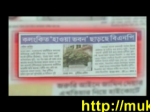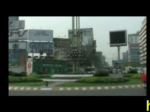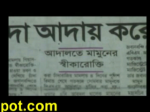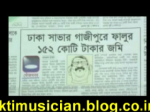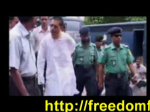Sahara set to bag Rs 80,000 crore new Bangladesh capital project
He may have broken up with his most romantic girlfriend but his romance with the aviation business continues. Subrata Roy, managing worker and chairman Sahara India Parivar, who describes the airline business as his idea of a romantic girlfriend is still passionate about the sector but is equally letting his vision fly into distant lands in search of greener pastures.
The group, which has been in the news more for issues relating to cricket and acquisition of an iconic London hotel, has silently created a bigger game plan, which includes getting into diverse areas like education, retail, mining, oil exploration and banking. Besides, it also includes entering newer geographies such as Bangladesh and Africa. But at the centre of it all is a Rs 80,000-crore project to create a new capital of Bangladesh-New Dhaka-and a real estate development project spanning five different locations in that country, land for part of which it has already acquired.
But even after selling off his airline-Air Sahara-to Jet Airways for Rs 2,000 crore six years ago, it's aviation that he wants to talk about the most. Roy believes aviation cannot be just a fancy of the rich and flamboyant but it should also make abundant business sense. "We should understand the importance of air transport in the economy of a country and what it stands for-connectivity."He also underscores the need for lower navigation charges, lower cost of fuel, besides concession and subsidy if the airline business is to survive.
Fresh into a new bonhomie with Kingfisher boss Vijay Mallya (they are partners in the F1 team Sahara Force India), Roy is in favour of the government bailing out the ailing airline because of the same economic necessity-connectivity. "There will be chaos if it is allowed to fail," he said and added quite radically that the government should also regulate the sector more to ensure that there are less players in the sector, so that they do not bleed to compete. An opponent of the open skies policy, which brought flying closer to the common man, he does not see reason in the argument that competition actually helps consumers bring down prices.
Roy by his own admission is most passionate about the media business (he is also launching tablets) but he beams as we change direction towards Dhaka.
"We are going into Bangladesh in a big way. I have finalized work of Rs 80,000 crore. It is a country, where we have lots to do. I have sent the proposal to the Bangladesh PM for the New Dhaka project and hope to meet her next month." He is not asking much from the government either . "Give us a sovereign guarantee and we will not need money. We have selected 40 sq km of land, 50 km from Dhaka and it is available to us. We will get the land, build our own structures and sell it," he said.
Sahara, which has real estate assets worth Rs 85,000 crore (according to the Sahara web site), also built a hill station in Maharashtra from scratch--Amby Valley.
Apart from Bangladesh, Sahara is also scouting for mining and exploration assets in Africa. Roy says that since most industrialists have to spend 50% of their productive time managing the system and chasing clearances, most of them are of the view that it's easier to do business outside India. Quizzed if he wants to opt out of the country he maintained a stoic defence: "I will stay and fight the system."
Banking is something strategic for the group as it has experience in dealing with deposits of people and naturally wants a licence. "We are the only company to have dealt with 5 crore people where no bank reaches. We have sent a proposal to the Reserve Bank of India seeking a licence", he said.
The action on retail will begin in March where it plans to invest Rs 17,000 crore. "We plan to set up one lakh organized distribution centres and the first such centre will come up in Rajasthan next month. They will work as modern kirana stores," he said.
This would be followed by an entry into the education sector, sometime in 2013. "We will enter in a big way by setting up universities, distance education centres but at the centre of it would be a project to take English to our villages. "Only 2-3 % of population know English, and is a big opportunity to bring people from all strata into the mainstream ," he said without providing any other details. For most of its proposed businesses in India, it plans to leverage on its field staff earlier involved in para banking and its network of 4800 offices all over the country.
Despite his conflicts with regulators-Sebi and RBI-over various issues recently and ongoing court cases, Roy is in a zone of his own. He is writing a book, which he describes as a philosophical , cultural and emotional experience. To be released later this year, its named quite simply--Life is too Beautiful, Learn it to Love it.
http://timesofindia.indiatimes.com/business/india-business/Sahara-set-to-bag-Rs-80000-crore-new-Bangladesh-capital-project/articleshow/12013626.cms
http://amardeshonline.com/pages/details/2012/02/25/133330
খালেদা ও রাজাকার
Razakar (Bengali: রাজাকার) was the name given to a paramilitary force organized by the Pakistan Army during the Bangladesh Liberation War in 1971.
The word razakar, originating from Persian, literally means "volunteer". The Razakar force was composed of mostly pro-Pakistani Bengalis and Urdu-speaking migrants living in erstwhile East Pakistan (now Bangladesh). Initially, the force was under the command of local pro-Pakistani committees, but through the East Pakistan Razakar Ordinance (promulgated by General Tikka Khan on 1 June 1971) and a Ministry of Defence ordinance (promulgated 7 September 1971), Razakars were recognized as members of the Pakistan Army. Razakars were allegedly associated with many of the atrocities committed by the Pakistan Army during the 9-month war (see 1971 Bangladesh atrocities).

These Pakistani offsprings were organized into Brigades of around 3-4000 volunteers , mainly armed with Light Infantry weapons provided by the Pakistani Army. Each Razakar Brigade was attached as an auxiliary to two Pakistani Regular Army Brigades, and their main function was to arrest and detain nationalist Bengali suspects. Usually such suspects were often tortured to death in custody. The Razakars were trained in the conventional army fashion by the Pakistan Army.
Following the liberation of East Pakistan as the independent country of Bangladesh, most of the leading Razakars, allegedly including Ghulam Azam, fled to Pakistan (previously West Pakistan). Ghulam Azam maintains that he went to Pakistan to participate in the Annual General Meeting of his organization, the Jamaat-e-Islami, but he was forced to remain overseas until General Ziaur Rahman allowed him to return to Bangladesh. Many of the lower ranking Razakars who remained in Bangladesh were killed in the course of reprisals immediately after the end of fighting while as many as 36,000 were imprisoned. Of the latter many were later freed mainly because of pressure from US and China who backed Pakistan in the war, and because Pakistan was holding 200,000 Bengali speaking military and civilian personnel who were stranded in West Pakistan during the war.
After the restoration of democracy in 1992, an unofficial and self-proclaimed "People's Court" (Bengali: গণআদালত Gônoadalot) "sentenced" Ghulam Azam and his ten accomplices to death for war crimes and crimes against humanity. However, as the Islamist Jamaat-e-Islami party was already a part of the ruling alliance in Bangladesh, the "verdict" was ignored. Moreover, the then Bangladesh Nationalist Party (BNP) government re-granted Bangladeshi nationality to Ghulam Azam, as it had been taken from him after the war. Subdued during the rule of Awami League from 1996-2001, Jamaat-e-Islami returned in full force after the next election in October 2001 in which a four party alliance led by BNP won a landslide victory. The new leader of Jamaat after Ghulam Azam's retirement, Motiur Rahman Nizami, a Razakar and among the ten people tried by the Gônoadalot, became an influential minister in the government.
The word রাজাকার razakar today carries the meaning "traitor" in common Bangladeshi Bengali parlance, similar to the usage of the word Quisling after the Second World War."we want war criminals punishment"
==============================================================================
ZIAUR RAHMAN REHABILITATE THE RAZAKARS AND BANGABANDHU MURDERERS
Ziaur Rahman, a Major in the Pakistan Army, Zia's unit (2/5 East Bengal Regiment) took control of the Kalurghat radio station in Chittagong at the onset of the Bangladesh Liberation War and on behalf of Bengali nationalist leader (Father of the Nation)Bangabandhu Sheikh Mujibur Rahman.made the most widely transmitted declaration of independence of Bangladesh which was the third and last in a series of such declarations. Recognized as a war hero, he was honored with the second highest national award Bir Uttom in 1972. A high-ranking accomplished officer in the Bangladesh Army, Zia was appointed chief of army staff in course of dramatic events that evolved following the assassination of Sheikh Mujibur Rahman in 1975 by a group of junior military officers and these army personnel met Ziaur Rahman at his residence to killed Sheikh Mujibur Rahman.
This was followed shortly by another coup and counter-coup and ultimately led to the consolidation of power under Zia as Deputy Chief Martial Law Administrator. The counter-coup, sometimes referred to as a sepoy mutiny was organized by the socialist Colonel Abu Taher.
This was followed shortly by another coup and counter-coup and ultimately led to the consolidation of power under Zia as Deputy Chief Martial Law Administrator. The counter-coup, sometimes referred to as a sepoy mutiny was organized by the socialist Colonel Abu Taher.
Ziaur Rahaman assumed the office of the President of the country in 1977 He engaged himself in politics by floating a political party that came to be known as janodal. Later he founded the Bangladesh Nationalist Party. For achieving popular support, he adopted policies bringing the government increasingly under Islam, which he included in the national constitution. It has been alleged that Zia helped individuals involved in the assassination of Sheikh Mujib rehabilitate home and abroad, immunized by the Indemnity Act. He also came to be known as Mr. Clean for his unquestionable integrity.
Coup of 1975 and its aftermath
On August 15, 1975 Sheikh Mujib and his family were killed by a group of military officers. One Sheikh Mujib's cabinet ministers Khondaker Mostaq Ahmad was appointed the president and, subsequently, Major General Ziaur Rahman was appointed as the army chief after removal of Major General Shafiullah. However, the coup of 15 August caused a period of instability and unrest in Bangladesh and more so across the ranks and files of the army. Brigadier Khaled Mosharraf and the Dhaka Brigade under Colonel Shafat Jamil made a counter-coup on November 3, 1975, and Ziaur Rahman was forced to resign and was put under house arrest. A third coup was staged under Colonel Abu Taher and a group of socialist military officers and supporters of the left-wing Jatiyo Samajtantrik Dal on November 7, called the "National Revolution and Solidarity Day" (Sipoy-Janata Biplob) (Soldiers and People's Coup) Brigadier Khaled Mosharraf was killed and Colonel Jamil arrested, while Colonel Taher freed Ziaur Rahman ( After few months Ziaur Rahman arrested and execute Colonel Taher )and re-appointed him as army chief. Following a major meeting at the army headquarters, an interim government was formed with Justice Abu Sadat Mohammad Sayem as chief martial law administrator and Zia, Air Vice Marshal M. G. Tawab and R ear Admiral M. H. Khan as his deputies. Zia also took on the portfolios of home affairs, finance, industry and information along with becoming the army chief of staff. However, discipline in the army had totally collapsed and it was difficult to disarm the soldiers and put them back to the barracks. Fearing that Colonel Abu Taher, who in fact rescued him few months earlier, would attempt to organise another revolt, Zia ordered his arrest. Following a secret trial in a military court, Zia authorised the execution of Colonel Taher on July 21, 1976. Zia became the chief martial law administrator following Justice Sayem's elevation to the presidency on November 19, 1976. He tried to integrate the armed forces, giving repatriates a status appropriate to their qualifications and seniority. While this angered some veterans of the Mukti Bahini, who had rapidly reached high positions following liberation in 1971, Zia defused potential threats from discontented officers by sending them on diplomatic missions abroad.

Ziaur Rahman Rehabilitate the war criminals and former Prime Minister Shah Azizur Rahman was one of them (Bengali: শাহ আজিজুর রহমান) (1925 – 1988) was a Bangladeshi politician who served as the Prime Minister of Bangladesh. However, he was the subject of considerable controversy for his collaboration with the Pakistan Army against the struggle to establish Bangladesh. Shah Azizur Rahman was born in Kushtia of the province of Bengal (now in Bangladesh). As a student political leader, Rahman participated in the Bengal Provincial Muslim League and the Pakistan movement. At the outbreak of the Bangladesh Liberation War, Rahman supported the Pakistani state forces and denounced the Bengali nationalist struggle, joining Bengali politicians such as Nurul Amin, Golam Azam and Motiur Rahman Nizami. He would lead the Pakistani delegation to the United Nations in November 1971, where he would emphatically deny that the Pakistan Army's Operation Searchlight had degenerated into genocide. Following the defeat of Pakistan in the Indo-Pakistani War of 1971, Rahman continued to reside in Pakistan. In the post-war period, authorities estimated that over a million people had been killed in Bangladesh by Pakistani state forces and collaborating militias. Rahman would continue to lobby Muslim nations in the Middle East to decline diplomatic recognition to Bangladesh.
Return to Bangladesh
Shah Azizur Rahman was permitted to return Bangladesh after liberation war. Shaikh Mujibur Rahman was a good friend of him and released Shah Aziz from jail. There are saying that while Azis was in prison Mujib provide his family 3,000 taka each month. When Major General Ziaur Rahman became the President of Bangladesh, zia allow Aziz to take part in national election and appointed him to the post of prime minister. Rahman also helped Zia organise the Bangladesh Nationalist Party, which won the 1978 parliamentary elections. Both Zia and Azizur Rahman have received fierce criticism for issuing the Indemnity Act, which gave amnesty to the killers of Sheikh Mujib and legalised the military coups of 1975.
MAULANA (GHU AZOM) GOLAM AZAM
(Bengali: গোলাম আযম) (born 7 November 1922), is a Bangladeshi political leader who is recognized by the Bangladeshis as one of the worst war criminals of the Liberation War of Bangladesh. The former Ameer of Jamaat-e-Islami Bangladesh, he opposed the independence of Bangladesh both during the liberation war and upon its liberation on December 16, 1971 and lead the formation of Shanti Committee, Razakar and Al-Badr to thwart the freedom fighters of Bangladesh. He also lobbied against the acknowledgment of new-born Bangladesh after 1971.
He was a permanent resident of England until 1978, and maintained Pakistani citizenship until 1994 due to the decision by the Bangladeshi government at the time to refuse him citizenship. From 1978 to 1994 he lived in Bangladesh illegally without any authorized Bangladeshi visa.In 1994, the Supreme Court upheld the decision to restore his citizenship of Bangladesh as a matter of birth-right.He was the leader of Jamaat-e-Islami Bangladesh until 2000.
EARLY POLITICAL CAREER
Azam entered politics as a student leader at Dhaka University, and in 1947 became the Secretary General of the Dhaka University Central Students Union. Among his earliest campaigns was participation in the Bengali Language Movement during 1950s. He submitted the memorandum to the Pakistan government demanding Bengali as one of the state languages, on behalf of the students of Dhaka University, following the demand made by Dhirendranath Datta in the Pakistan Constituent Assembly in February 1948 and the resulting nationalist uprising in East Bengal. Azam, however, distanced himself from the Language Movement when it became clear that it was becoming a rallying call for a secular Bengali nationalist movement rather than one focused on Bengali Muslim activism alone. Since his return to Bangladesh in the 1970s Ghulam Azam has never participated in the official commemorations of the Language Movement and he and his party celebrate that event separately
Azam became the secretary of the Islamist political party, Jamaat-e-Islami Bangladesh, in 1957. Later, he became the Ameer (president) of the Jamaat in East Pakistan in 1969. He was also a participant in the formation of the Pakistan Democratic Alliance in 1967.
EARLY INITIATIVES WITH SHANTI COMMITTEE
During the Bangladesh Liberation War of 1971, Azam played a central role in the formation of Peace Committees, which declared the independence movement to be a conspiracy hatched by India.[2] Azam was one of the founding members of this organization.[2] After the genocide of 25th March Pakistani forces lost control of Bangladesh. To help control this situation Pakistani army set up a network of peace committees superimposed upon the normal civil administration as army couldn't rely upon that administration. Peace Committee members were drawn from Jamaat-e-Islami led by Ghula Azam, Muslim League and Biharis. Peace committee served as the agent of army, informing on civil administration as well as general public. They were also in charge of confiscating and redistribution of shops and lands from Hindu and pro-independence Bengali- mainly relatives and friends of the freedom fighters. Almost 10 million Bangladeshis fled to neighboring India as refugees. The Shanti Committee also recruited Razakars. Razakars were common criminals who had thrown their lots with the army.
CORRUPTION LIST OF SADEK HOSSAIN KHOKA : MAYOR OF DCC:
Dhaka – The Supreme Court in Bangladesh has stayed for a week the launching of the open trial of Dhaka Mayor Sadek Hossain Khoka on corruption charges, officials said Tuesday.
The highest judiciary granted bail to Khoka, urging the interim government to submit all proof and documentary evidence to the court by next week before the legal proceedings can start.
The bail, which expires on July 16, covered the arrest warrants for the mayor and his close family members.
Earlier senior metropolitan judge Azizul Haque issued warrants to police to detain the mayor, his wife and two children to stand trial for illegally acquiring huge wealth and concealing the same from the tax authority.
The Anti-Corruption Commission filed the case in April against Khoka, who is also a stalwart in the opposition Bangladesh Nationalist Party (BNP).
The BNP was in power along with Islamists for five years before it quit office in October 2006 amid political turmoil. (dpa)
They blamed DCC Mayor Sadeque Hossain Khoka for failure to take necessary steps for construction and repair of roads, proper management of waste and tackling mosquito menace. The legislators had a meeting with the mayor at Nagar Bhaban, organised by him…
Not my name on defaulter list: mayor Khoka
Sirājganj :: Bangladesh | about 1 year ago
Credibility
Dhaka, Dec 3 (bdnews24.com) Mayor Sadek Hossain Khoka has clarified that his name does not appear on a list of loan defaulters of Sonali Bank, after the name 'Sadek Hossain' was found on the list. "The publication of this list has caused embarrassment…
SC hears challenge to Khoka bail on July 24
Dhaka, July 13 (bdnews24.com)�The Appellate Division on Sunday did not halt the High Court bail to Dhaka mayor Sadek Hossain Khoka in a graft case filed by the Anticorruption Commission. Appellate Division chamber judge Md Abdul Matin did not put freezes…
Bangladesh grants temporary bail to Dhaka mayor
The mayor of Bangladesh's capital city was granted temporary bail on Monday just hours after a court issued an arrest warrant against him on corruption charges, officials said. Dhaka Mayor Sadek Hossain Khoka, who is also a senior leader of the Bangladesh…
Khoka appeals for quashing case proceedings
An HC bench comprising Justice Sharif Uddin Chaklader and Justice Md Emdadul Haque Azad yesterday heard arguments of the petitioner's counsel, barrister Rafique-ul Huq, and fixed today for hearing arguments of the ACC, which filed the case. Rafique-ul…
2
Dhaka – The Supreme Court in Bangladesh has stayed for a week the launching of the open trial of Dhaka Mayor Sadek Hossain Khoka on corruption charges, officials said Tuesday.
The highest judiciary granted bail to Khoka, urging the interim government to submit all proof and documentary evidence to the court by next week before the legal proceedings can start.
The bail, which expires on July 16, covered the arrest warrants for the mayor and his close family members.
Earlier senior metropolitan judge Azizul Haque issued warrants to police to detain the mayor, his wife and two children to stand trial for illegally acquiring huge wealth and concealing the same from the tax authority.
The Anti-Corruption Commission filed the case in April against Khoka, who is also a stalwart in the opposition Bangladesh Nationalist Party (BNP).

The BNP was in power along with Islamists for five years before it quit office in October 2006 amid political turmoil. (dpa)
They blamed DCC Mayor Sadeque Hossain Khoka for failure to take necessary steps for construction and repair of roads, proper management of waste and tackling mosquito menace. The legislators had a meeting with the mayor at Nagar Bhaban, organised by him…
Not my name on defaulter list: mayor Khoka
Sirājganj :: Bangladesh | about 1 year ago
Credibility
Dhaka, Dec 3 (bdnews24.com) Mayor Sadek Hossain Khoka has clarified that his name does not appear on a list of loan defaulters of Sonali Bank, after the name 'Sadek Hossain' was found on the list. "The publication of this list has caused embarrassment…
SC hears challenge to Khoka bail on July 24
Dhaka, July 13 (bdnews24.com)�The Appellate Division on Sunday did not halt the High Court bail to Dhaka mayor Sadek Hossain Khoka in a graft case filed by the Anticorruption Commission. Appellate Division chamber judge Md Abdul Matin did not put freezes…
Bangladesh grants temporary bail to Dhaka mayor
The mayor of Bangladesh's capital city was granted temporary bail on Monday just hours after a court issued an arrest warrant against him on corruption charges, officials said. Dhaka Mayor Sadek Hossain Khoka, who is also a senior leader of the Bangladesh…
- we want war criminals punishment
- Salauddin Quader Choudhury (SAKA)
Khoka appeals for quashing case proceedings
An HC bench comprising Justice Sharif Uddin Chaklader and Justice Md Emdadul Haque Azad yesterday heard arguments of the petitioner's counsel, barrister Rafique-ul Huq, and fixed today for hearing arguments of the ACC, which filed the case. Rafique-ul…
2
The new list contains the names of Awami League leaders Syeda Sajeda Chowdhury, Tofael Ahmed and Kazi Zafrullah, BNP LEADERS DHAKA MAYOR SADEK HOSSAIN KHOKA, Khulna Mayor Sheikh Taibur Rahman, former state minister Maj (retd) Kamrul Islam, former Deputy Minister for Food Asadul Habib Dulu, former BNP MP Syed Mehedi Ahmed Rumy and former BNP MP and ex-Red Crescent Society chairman Shahidul Haque Jamal.
Prominent businessmen Latifur Rahman of Transcom, Abdur Rouf Chowdhury of RANGS Group, Abdul Matlub Ahmed of Nitol Group and Abul Khair Litu of Bengal Group are also in the list.
Others who are reportedly on the list include former BNP ward Commissioner Nobiullah Nobi, former BRTC chairman Tamur Alam Khandaker, BNP leader from Rajshahi Shis Mohammad, former BNP Shahidul Islam, former BNP MP Abul Khair Bhuiyan, Dr Dewan Salauddin, former state minister for Energy AKM Mosharaf Hossain, Ward commissioner Saidur Rahman Shahid, former BNP MP Fazlul Haque Milon, former Finance Minister Saifur Rahman's son Shafiur Rahman Babu, DCC ward commissioner Salimullah Salu, former MP Abdul Gafur Miah, Srimongal pourasava chairman Mohsin Miah alias Modhu Miah, former BNP MP Ilyas Ali, former BNP MP Professor Zoynal Abedin alias VP Zoynal, former BNP MP Sarder Sakhawat Hossain Bakul, AL leader AKM Jahangir Hossain, former MP Mirza Abdul Latif, AL leader Shawkat Hossain Hiron, former Chatra League presidents Ishaq Ali Khan Panna and Enamul Huq Shamim, former chief whip Abul Hasnat Abdullah's son Sadek Abdullah, Dhaka City AL acting president Rahmat Ullah, former Jatiya Party MP Nasim Osman, former JP MP Moshiur Rahman Ranga, Liberal Democratic Party presidium member Professor Jahanara Bagum, former BNP MP Mohammad Ali Zinnah, Jamaat leader Maulana Samiul Huq Farooqi of Gazipur, former Islami Bank chairman Meer Kashem Ali, former Law Secretary Alauddin Sarder, former Communication secretary Rezaul Hayat former Prime Minister Khaleda Zia's APS Abdul Matin, Khaleda's APS Shamsul Alam, Khaleda's protocol officer Faridul Islam, former Prime Minister Sheikh Hasina's APS Alauddin Nasim, former DC of Bagora and Director General of Disaster Management Rafiqul Mohammad, former additional chief engineer of Roads and Highway Khondoker Azadur Rahman, former additional chief engineer of Roads and Highway Giusuddin Tulu, former chief engineer of Roads and Highway Fazlul Haque, former Public Service Commission member Musleuddin, former chief Engineer of Department of Education Engineering Abdul Mannan, chairman of Bengal Group Abul Khair Litu, managing director of Eastern Group Manzurul Islam Babu, businessman Anis Ahmed Guki, businessman Shawkat Hossain of Chittagong, chairperson of Prashika Dr Kazi Faruque Ahmed, chairman of Jubok Abu Sayeed Chowdhury, former Adviser of Caretaker Government Justice Fazlul Haque, Engineer Aftab of Reza Construction, Civil Aviation Authority chief engineer Harunur Rashid, former Director General of Agricultural Extension Department Ibrahim Khalil, former director general of Drug Administration Professor Habibur Rahman, former assistant general manager of Bangladesh Bank Golam Mostafa, CBA leader of Rajuk and Amir Khasru, executive engineer of DCC Syed Mozaffar Hossain, former managing director of Essential Drugs Harunar Rashid, former managing director of Teletalk M Obaidullah, divisional Engineer of T and T Mohammad Towfiq, former deputy director of Agricultural Extension Department Javed Iqbal, officer of Water Development Board Zahirul Karim, additional Commissioner Golam Mostafa, National Board of Revenue member Ali Ahmed, Hazi Aminul Haque Shamim, owner of Momen Construction Abdul Monem, managing director of Bangladesh Gas Field Company Shahidul Abedin, Abdul Awal Talukder of Talukder Money Exchange, businessman of Narsingdi Abdul Quader Molla and former Bangabhaban official assistant secretary Nasir.












